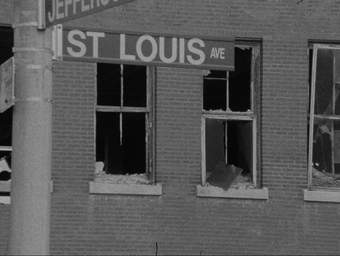Christopher Harris’s films are haunting. For over 25 years, he has worked with 16mm film and video installations to explore African American history. In a text about his film Speaking in Tongues, Harris explained: “In the making of my work, I begin from the proposition that descendants of enslaved people, in particular, African Americans, have a fundamentally different relationship to time and space than members of the dominant culture.”
From his 2001 MFA thesis film, still/here, to his recent Speaking in Tongues: Take One, Harris has remained one of the most inventive artists working in analog film. His slow, deliberate gestures of editing, slicing, and re-jigging question the practice and pace of image production.
For years, Harris has been developing a 16mm film inspired by Ishmael Reed’s 1972 novel Mumbo Jumbo. In his Speaking in Tongues: Take One, premiering in the UK at Tate Modern, Harris expands on Reed’s plot using found footage from Hollywood films, cartoons and documentaries. Mumbo Jumbo tells a story of resistance against the suppression of Black dance culture. Referred to as a “virus”, the book introduces the character of “Jes Grew”, a personification of ragtime, jazz, polytheism, and freedom. In Speaking in Tongues: Take One, Harris borrows from the tradition of free jazz and avant-garde musical forms and suggests that other ‘takes’, or interpretations, could emerge in years to come. The film, which cites Reed, addresses the American carceral system, and Black resistance through states of ecstasy.
Two other black-and-white works by the artist follow: b/w is a short meditation on colourism, and Harris’ first feature, still/here, presents the urban landscape of St. Louis, Missouri, where he is from.
This programme features the UK release of two new films, b/w and Speaking in Tongues: Take One, as well as the premiere of a newly restored print of still/here. The screening is co-presented with Barbican, where Harris’s lecture God Bless the Child will be held on 27 May.


